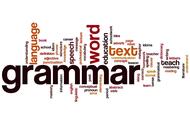Knock knock. Who's there?
咚咚咚。谁在那?
To. To who?
是 To。要给谁?
No, it's to whom. . . . Argh. . .
不对,“谁”要用宾格形式。笑话好冷。
Hi everyone. I'm Vicki and I'm British. - And I'm Jay and I'm American.
大家好!我是薇姬,我是英国人。 - 我是杰,我是美国人。
We've had a lot of requests for a video about 'who' and 'whom'. It's taken us a long time to make it.
我们收到了很多关于 who 和 whom 的区别用法的视频请求。我们花了很长时间才做出这期内容。
Why is that? It's because of the word 'whom'.
这是为什么呢?都是因为“whom”这个词。
We don't use it much these days. We usually say who instead when we're speaking.
我们现在不怎么用这个词了。我们通常在说话的时候都会用 who 代替。
And what about written English? That's different.
那么书面英语呢?那就不一样了。
There are particular documents where we use whom. We'll tell you more about that later.
有一些特殊的文件,我们会使用 whom。稍后我们会告诉大家更多。
But first we'll show you how 'who' and 'whom' work. Yeah, you need to know about subjects and objects.
但首先我们将告诉你“who”和“whom”是怎么用的。是的,你需要了解主格和客格。
Oh no, what happened? - I don't know! Someone hit me!
哦,不是吧,发生了什么? - 我不知道!有人打了我!
Who hit you? I've no idea.
谁打你?我不知道。
Oh dear. But I'll be ready next time.
哦亲爱的。不过下次我会准备好的。
So what happened there? Someone hit me!
那么,发生了什么?有人打了我!
So someone, we don't know who, did the action and Jay received the action. Someone is the subject in this sentence and Jay is the object.
所以有人,我们不知道是谁,做了打的动作,而杰承受了这个动作。在这个句子中,某人是主语,杰是宾语。
Yeah! But it won't happen again.
没错!但这不会再发生了。
You hit someone! Yep!
你打了人!是的!
Who did you hit? That guy over there!
你打了谁?那边那个人!
So this time you hit someone else. Yeah, I got that guy!
所以这次你打了别人。是啊,我打到他了!
So in this sentence Jay's the subject because he did the action, and the other guy's the object because he received the action. Vicki asked me two questions.
那在这个句子中,杰是主语,因为他做了这个动作,而另一个人是宾语,因为他接受了这个动作。薇姬问了我两个问题。
First she asked about the subject. And then she asked about the object.
首先她先问的是主语。然后她问的是宾语。
She used the pronoun 'who' both times. When we're speaking, we use who to ask about the subject and the object.
她两次都用了代词 who。当我们说话的时候,我们用 who 来询问主语和宾语。
But according to an old rule of formal grammar, I made a mistake here. The rule goes we should use 'who' to ask about the subject, and 'whom' to ask about the object.
但是根据正式语法的旧式规则,我在这里犯了一个错误。规则说我们应该用 who 来询问主语,用 whom 来询问宾语。
So 'Who hit Jay? ' and 'Whom did Jay hit'? So that's the difference between 'who' and 'whom'.
所以“谁打了杰?”和“杰打了谁?”这就是 who 和 whom 的区别。
Who is a subject pronoun and whom is an object pronoun. Yeah.
who 是主语代词,whom 是宾语代词。是的。
We need another example. Hey, stop that man.
我们需要另一个例子。喂,拦住那个人。
Take a look at these questions. If you follow the traditional grammar rule, one question should start with 'who' and the other should start with 'whom'.
看看这些问题。如果你遵循传统的语法规则,一个问题应该以“who”开头,另一个问题应该以“whom”开头。
Can you work out which is which? You need to think about subjects and objects.
你能分清哪个是哪个吗?你需要考虑主语和宾语的问题。
So we're asking a question about who did the action here — the chasing. So this question is asking about the subject of the sentence.
所以我们要问的问题是谁做了这个动作——追逐。那么这个问题问的是句子的主语。
We use 'who' because 'who' is a subject pronoun. And this question is asking about who received the action — the object, whom is an object pronoun.
我们用 who 是因为 who 是主语代词。这个问题问的是谁接受了这个动作——宾语,whom 是宾语代词。
If you think it sounds complicated, you're not alone. A lot of people find it hard.
如果你觉得这听起来很复杂,那么你并不是一个人。很多人都觉得它很难。
Native speakers often get confused. These days, when we're speaking, we use 'who' in both questions so a lot of English speakers don't know when to use whom.
英语母语人士也经常会很糊涂。现在,当我们说话的时候,我们在两种问句中都使用 who,所以很多英语母语人士不知道什么时候使用 whom。
But don't worry. There's a trick for working it out.
不过别担心。这里有个技巧可以解决这个问题。
It's the 'he-him' test. We'll show you how it works.
就是“he-him”测试。我们会告诉你如何使用这个方法。
If you're not sure whether to use who or whom, try answering the question with another pronoun that you already know. You probably know these.
如果你不确定是用 who 还是 whom,试着用另一个你已经知道的代词来回答这个问题。你可能认识这些单词。
They're all subject pronouns. And you probably know these too.
它们都是主语代词。你可能也知道这些单词。
They're all object pronouns. We can use 'he' and 'him' to test whether 'who' or 'whom' works.
它们都是宾语代词。我们可以用“he”和“him”来测试“who”或“whom”是否可用。
Notice that 'he' and 'who' are both subject pronouns and 'him' and 'whom' are both object pronouns. And also notice that 'him' and 'whom' both end with the letter M.
注意,he 和 who 都是主语代词,him 和 whom 都是宾语代词。还要注意,“him”和“whom”都以字母 m 结尾
That will help you remember that they go together. Here's an example.
这将帮助你记住它们是属于同一范畴。现在看一个例子。
Should you say 'who' or 'whom' here? No idea?
在这里你应该说“who”还是“whom”?不知道吗?
Then try answering with 'he' or 'him'. He follows me on Twitter — that sounds possible.
那试着用“he”和“him”来回答。他在 Twitter 上关注我——这听起来有可能。
What about him? 'Him follows me on Twitter. '
那用 him 呢?他在推特上关注了我。
No, that sounds wrong. So 'who' is correct.
不行,听起来不对。所以用 who 是正确的。
Here's another example. Is the missing word who or whom?
这里还有一个例子。缺的那个词是 who 还是 whom?
Well, let's answer the question with 'he'. 'I follow he'.
让我们用“he”来回答这个问题。我跟着他。
No, that sounds wrong. Let's try 'him'.
不行,这听起来不对。让我们尝试用 him。
'I follow him'. That sounds good.
我跟着他。听起来不错。
So the answer here is whom. So that's a way to test if it's who or whom.
所以答案是 whom。这是一种测试用 who 还是 whom 的方法。
But remember, we don't normally follow this rule in spoken English. We use who as an object pronoun these days.
但是请记住,在英语口语中我们通常不遵循这个规则。现在我们用 who 作宾语代词。
But some people get upset about it if they see who instead of whom. Yes, like Twitter has a feature called 'Who to follow' and some people complained and wanted them to call it 'Whom to follow'.
但是有些人如果看到的是 who 而不是 whom,就会很不爽。是的,就像 Twitter 有一个叫做“关注谁”的功能,一些人就抱怨,希望他们把它改成“Whom to follow”。
'Whom to follow' — that's technically correct. But we'd never say it.
用宾格形式表达“关注谁”——严格意义上讲这才是正确的。但我们绝不会这么说。
I think it's a silly idea. Whom sounds very old-fashioned.
我认为这是个很愚蠢的想法。Whom 听起来很老派。
And very, very formal. Whom can sound pompous.
而且非常非常正式。Whom 听起来还很浮夸。
Exactly. 'Whom' creates a social distance between you and your listener.
没错。“Whom”在你和你的听众之间制造了社交距离。
You don't want to sound pompous. It's not a good thing.
你不想让自己听起来很浮夸吧。这不是什么好事。
Another word that's similar to pompous is pretentious. Whom can sound pretentious.
与 pompous 相似的另一个词是自命不凡。Whom 听起来也有些自命不凡。
You don't want to seem like you're pretending to be more sophisticated than you are. So be careful with the word whom.
你不想让人觉得你在假装自己比实际上更精明老练。所以要小心使用“whom”这个词。
Don't say it in questions when you're speaking. Yeah.
日常说话的时候不要在问句中用 whom。是的。
But there's another grammatical structure where we could use whom. What's that?
但是还有另一种语法结构,我们可以用 whom。什么结构?
Relative clauses. Oh let's see some.
关系从句。哦,让我们看看。
Now before we start the conference, there are some people whom we must thank. There's Mr. Jones, who sent the invitations and Mrs. Smith, who organized the accommodation.
现在,在我们开始会议之前,我们必须感谢一些人。感觉琼斯先生,他发出了邀请函,还要感谢史密斯夫人,她安排了住宿。
And then there's Mr. Peters, whom you will meet later when he will explain the conference schedule. And then there's something green in your teeth.
然后还要感谢彼得斯先生,你们稍后会见到他,他会解释会议日程安排。然后你牙齿里有绿色的东西。
Is it gone? Yeah, you're all right.
我牙上的东西没了吗?是的,你很好。
Let's see how those relative clauses work. We use relative clauses to add information about someone we've just mentioned.
让我们看看在这些关系从句中是如何使用 whom 的。我们使用关系从句来添加我们刚刚提到的人物的信息。
The same rules for who and whom apply. We use who for subjects and whom for objects.
对于 who 和 whom 的规则是一样的。我们用 who 作主语,whom 作宾语。
And if you're not sure, you can use the 'he-him' test again. So with Mr Jones?
如果你不确定,你可以再次使用 he-him 测试一下。那琼斯先生呢?
Did 'he' send the invitations or did 'him' send the invitations? He did, so we need the subject pronoun here — who.
是“他”发了邀请函,用 he 还是 him呢?用 he,所以我们这里需要主语代词——who。
And it's the same with Mrs Smith. She did the action so we say who.
关于史密斯夫人也一样。她做了这个动作,所以我们用 who。
And some more examples. 'We must thank some people'.
再举几个例子。“我们必须感谢一些人”。
We must thank 'he'? That doesn't sound good.
我们必须感谢“他”?听起来不太好。
We must thank 'him'. That works, so we need an object pronoun.
我们必须感谢“他”。这样就行了,所以我们需要一个宾语代词。
And the last one, Mr. Peters. Are we going to meet 'he' later or 'him' later?
还有最后一个,彼得斯先生。我们稍后会见到“他”是用 he 还是 him?
It's him so we say 'whom'. You'll only find whom used like this in very formal spoken English.
是 him,所以我们用 whom。你只会在非常正式的英语口语中发现 whom 这样的用法。
Normally we'd say who in these examples. Languages change over time and in spoken English 'whom' has been disappearing.
通常在这些例子中我们会说 who。语言会随着时间的推移而改变,在英语口语中,“whom”这个词正在渐渐消失。
In fact it's almost gone. And what about written English?
事实上,它几乎已经消失了。那么在书面英语中呢?
It's hanging on there. We still use it, but only in formal writing.
它还在继续使用。我们现在还在使用它,但只在正式的写作中使用。 =xqy=
In emails and texts, we'll use who instead of whom. But some companies have a house style for formal reports where they use 'whom'.
在电子邮件和短信中,我们会用 who 而不是 whom。但有些公司在正式报告中会使用“whom”,这也是他们独特的风格。
And whom is still the house style for the New York Times. I did a search of my computer and I found 'whom' in two kinds of documents.
whom 现在仍是《纽约时报》的招牌使用风格。我在我的电脑上搜索了一下,我在两种文件中找到了“whom”。
What were they? Legal documents like contracts.
都是什么文件?法律文件,比如合同。
Ah yes. Contracts are written in a very formal style.
哦,是的。合同是用非常正式的文体写的。
And academic papers. So research papers that are published in journals.
还有学术论文。就是在期刊上发表的研究论文。 每日英语
That makes sense. They're formal too.
这是有道理的。它们也很正式。
Oh and I also found it in a reference. A job reference?
哦,我还在一封推荐信中找到了它。工作推荐信。
Yes, I'd written a reference for someone and I didn't know the name of the person I was writing to, so I addressed it to 'To whom it may concern'. That's a standard phrase — I often use it when I submit job applications.
是的,我为别人写了一封推荐信,但我不知道收件人的名字,所以我把它写成“敬启者”。这是标准的短语——我在提交工作申请时经常使用它。
And again, it's very formal. And it's interesting, because a lot of the time, we can write who instead of whom these days and it's fine and appropriate, but here we wouldn't write who.
同样,这也是非常正式的。而且很有意思,因为现在很多时候,我们可以写 who,而不用写 whom,而且完全没关系,也很合适,但在这里我们不会写 who。
It would sound strange. It has to be whom.
听起来会很奇怪。必须是 whom。
Is it because it comes after a preposition? Yes, in formal writing it's better to write whom in constructions with prepositions.
是因为它跟在介词后面吗?是的,在正式写作中,带介词的构词中最好写 whom。
In fact, the most common way we use whom is in phrases like one of whom, some of whom, most of whom. So we'd write whom here, not who, because it comes after 'of'.
事实上,我们使用 whom 最常见的方式是在短语中,如“其中一个,其中一些,其中大多数”。所以我们在这里会写 whom,而不是 who,因为它在 of 后面。
Yes. Whom often follows a preposition: of whom, with whom, from whom, and to whom of course.
是的。Whom 通常跟在介词后面:of whom,with whom,from whom,当然还有 to whom。
But that's formal writing. In spoken English 'to whom' sounds silly.
但这是在正式的写作中。在英语口语中,to whom 听起来就很傻了。
Now settle down children. We're going to do some grammar.
现在安静下来,孩子们。我们要学一些语法。
To whom does this sock belong? According to the traditional grammar rule, this question is correct.
这只袜子是谁的?按照传统的语法规则,这个问题的问法是对的。
But we would never say it. We might say who does this sock belong to — but then the question ends with a preposition.
但我们永远不会这么说。我们可能会说“这只袜子是谁的”——但这个问题是以介词结束的。
Yeah. That's fine. But when I was in school my teachers said you shouldn't end a sentence with a preposition.
是啊。没关系的。但是当我在学校的时候,我的老师说你不应该用介词来结束一个句子。
That rule is stupid. If you want us to make another video about silly English grammar rules, tell us in the comments.
这个规则太傻了。如果你想让我们再制作一期关于愚蠢的英语语法规则的视频,请在评论中告诉我们。
Do you think the who-whom rule is silly? Errr no.
你认为 who-whom 的使用规则很傻吗?哦我不这么想。
The word whom is disappearing, but there are still places where it's appropriate to use whom — like in formal writing. We hope this video has been useful for the writers who we teach — whom we teach — who we teach…
whom 这个词正在消失,但仍有一些地方适合使用 whom——比如在正式写作中。我们希望本期视频对我们所教的写作者们有些用处,这里该用 whom 吗,还是用 who 来着……
It's time to stop. If you've enjoyed this video, please share it with a friend.
是时候结束本次课程了。如果你喜欢这个视频,请与朋友分享。
And don't forget to subscribe to our channel. See you next week everyone.
不要忘记订阅我们的频道。大家下周见。
Bye. Bye-bye.
再见。再见。
,










